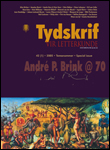Brinkmanship: Storytellers and the novelist
DOI:
https://doi.org/10.4314/tvl.v42i1.29690Keywords:
literary discourse, representation, story, storytellerAbstract
André Brink has always insisted on the importance of "imagining the real" as the writer's art and responsibility, particularly in a repressive society. In his essays of the 1970s, "imagining the real" privileges literary discourse to tell the truth. This is exactly what his novels of the same decade set out to do. Looking on Darkness and A Dry White Season employ first-person narrators - an anonymous novelist and an autobiographical voice - as witnesses, whose main concern is to imaginatively turn a series of events into a plot which will reveal the truth behind mere facts, and through representation protest against the apartheid state. In the 1990s, "imagining the real" takes a postmodernist turn. The novelistic voices of the earlier texts have been replaced by storytellers, e. g. Estienne Barbier in On The Contrary and Ouma Kristina in Imaginings of Sand. In their different ways, the two novels offer many, often contradictory and fantastic, versions of the past. They no longer claim to tell the truth, but are intent on "reattaching imagination to the collective memory" (G. Hartman).
Downloads
References
...
Downloads
Published
Issue
Section
License
Copyright (c) 2005 Tydskrif vir Letterkunde

This work is licensed under a Creative Commons Attribution-ShareAlike 4.0 International License.


 https://orcid.org/0000-0001-6465-6584
https://orcid.org/0000-0001-6465-6584


.png)